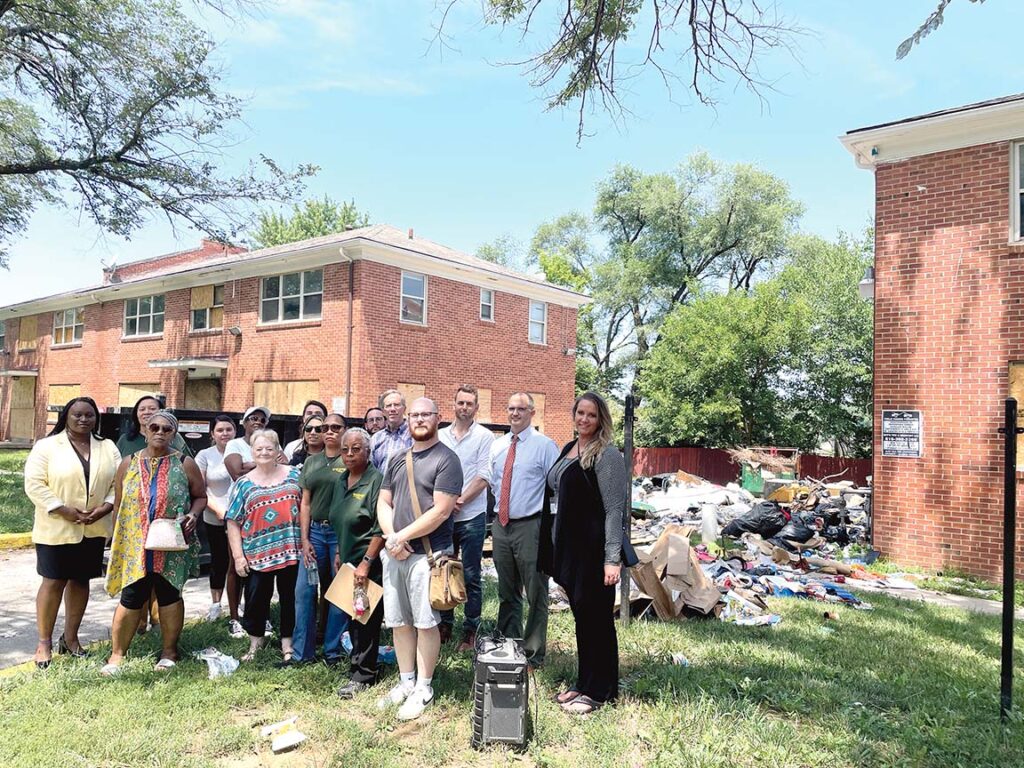
Abby Hoover
Managing Editor
Neighborhood Legal Support (NLS) and Legal Aid of Western Missouri are helping Northeast and East Side neighborhoods fight back against out-of-state investors leaving multi-family housing properties abandoned and blighted.
On Friday, July 21, the organizations, joined by leadership from Indian Mound, Lykins and Town Fork Creek, gathered at 3000 E. 49th Street to discuss the litigation and call out Whitestone Real Estate Fund, the investment group that owns dozens of properties on Kansas City’s Northeast and East Side.
“The apartment complex behind us had over 60 units when it was acquired by Whitestone and their investment fund in 2022,” Alissia Canady, Deputy Executive Director with NLS, said. “Over 60 units are unoccupied today. Look at it, it’s desolate, it’s uninhabitable. It’s boarded up and full of trash all throughout the property.”
NLS filed litigation against this property at the end of May, giving Whitestone several months to clean it up, Canady said. NLS, a nonprofit law firm, operates and focuses on community development, acting on behalf of neighborhood associations and nonprofits to address blight, violent crime and economic despair in communities.
“We see what the condition is in, despite the best efforts of the neighborhood to call the City, despite the best efforts of community builders – the plaintiff in this case – and our attorneys at Neighborhood Legal Support and Legal Aid,” Canady said. “They just have not done good as neighbors in this community.”
Lisa Ray, President of Town Fork Creek Neighborhood Association, said neighbors have tried to contact many, many organizations for help. They come out as a neighborhood group when they can to clean up the property.
“We’re out here all the time trying to clean up, so it means a lot for everyone to come out today,” Ray said. “We love you and thanks for your help.”
She and her neighbors take pride in their community, and many are working on upgrading their homes. The deterioration in the property since Whitestone purchased it in 2022 is visible as the driveways are overflowing with trash and furniture, windows and doors are boarded up, and rodents and bugs are attracted by the associated smells.
“They have to ride by and see this, it is kind of appalling,” Ray said. “It’s depressing for our youth to come out and see it. They go to school around here. So we just try to encourage everyone to try to get out, but it’s hard because they’re older and they just can’t come out. So we do our best to try to come out when we can… Thank you for coming out and engaging with us and caring about our community.”
Diana Graham is the President of the Lykins Neighborhood Association, where there’s another Whitestone owned property at 622 Hardesty, adjacent to the planned Hardesty Industrial Complex redevelopment.
“Lykins has been fighting really hard and working really hard for the last three or four years to get rid of blighted housing, then we have someone like Whitestone come in and buy up properties and make us ashamed,” Graham said. “We’re mad as hell and we’re not going to stand for it anymore. So I want to tell you, take this as notice Whitestone, we’re coming after you and don’t think we’re not.”
Lykins worked with Gregg Lombardi, Executive Director at Neighborhood Legal Support of Kansas City, for the past three years as he served as Executive Director of the Lykins Neighborhood Association to nearly eradicate blighted and vacant housing in the neighborhood whose population has median household income below $25,000.
Jimmy Fitzner, newly elected Indian Mound Neighborhood Association President, has been aware of the blighted properties, owned by Whitestone and other investment groups, in the neighborhood he’s called home his whole life throughout his time serving on the Indian Mound board.
“First of all, thank you for having us in your neighborhood, in Town Fork Creek. It is a beautiful neighborhood. You deserve better than this,” Fitzner said to his hosts. “But I’d like to summon the sentiment that we’re not on defense anymore. We’re tired of being upset about this. We’re on offense now.”
Indian Mound has been working with Brandon Mason, Managing Attorney of the Economic Development Unit at Legal Aid, to address blighted properties in the neighborhood.
“We’re going to take these people to court because we’re not going to have these kinds of properties in our neighborhoods anymore where they’re rundown, not taken care of, when they could be housing for people that should be living here,” Fitzner said. “We know what abandoned properties do, there’s study after study. We know what happens when people abandon properties like this in our neighborhood. Vacant lots lead to illegal dumping and lead to crime in our neighborhoods. We’re not going to stand for it anymore.”
To Fitzner, these bad neighbors are on another level.
“We talk about bad neighbors and what a bad neighbor looks like, so you’ll hear some folks think about they’re playing their music too loud or their lawn is long, but there is a much more nefarious bad neighbor that is inundating all of these neighborhoods, not just Town Fork Creek, not just Indian Mound over on the Northeast side, all over our city, and it’s the type of neighbor who’d use housing just as a commodity and just as another line item on their portfolio to try to profit off of, regardless of the state that it’s in,” Fitzner said. “We’re done with it. We’re going upstream to fight this problem. And I’m deeply thankful for us to be able to do this, for Legal Aid to be able to represent us, and we’ll see you all in court.”
Denver-based Whitestone owns at least a dozen properties under variations of the names Wref I LLC and Wref II LLC in Northeast Kansas City. Canady said they’ve bought over 450 properties in Kansas City in the past few years.
The property on East 49th is adjacent to Community Builders’ multi-million dollar development along the Martin Luther King Jr. Boulevard corridor, so not only are they not being good neighbors, they’re also being impediments to economic development on the East Side, Canady said.
“We’re sending notice today against Whitestone and all the other corporate investors that are buying properties in our community that we will not stand for this,” Canady said. “We will not stand for the abuse, the neglect and displacement of our residents in Kansas City.”
“The Missouri State Legislature has put in place legislation through the Abandoned Housing Act and the Civil Nuisance legislation that allows us to bring litigation against these negligent property owners in our community,” Canady said. “It holds them accountable, and so we’re in that process. There are at least four lawsuits that have been filed against Whitestone for various properties in our community.”
Whitestone is a $100 million investment fund. The minimum investment to get into this fund is $250,000, Canady said. They tout this to their portfolios that they’re providing quality, affordable rental housing. Do you see quality, affordable housing behind us? Not at all. It is not quality, it is not affordable. As a matter of fact, it is desolate, blighted, and despair and so it’s not safe for our community, it’s not safe for our children.”
If successful in court, the properties would be put back in the hands of nonprofit agencies, neighborhood associations, community development corporations, and Community Builders of Kansas City, giving them an opportunity to rehab these properties and put families back in them.
Josh Henges, Kansas City’s Homeless Prevention Coordinator, said someone from his team was at the property in November 2022 when families were being displaced.
“I had the opportunity to work at the City about a year and a half ago, the City wants to figure out how to end homelessness,” Henges said. “The stuff that’s happening here is moving us in the opposite direction. It has never been harder to get folks housed than right now, and it’s never been harder to keep folks housed than right now.”
Henges said this partnership working on legal action against the owners is about setting a standard for investors.
“If you’re going to invest in Kansas City, it means investing in the neighborhood,” Henges said. “It’s beyond a balance sheet. We can do nothing as individuals, we don’t have $100 million. I don’t have $250,000. I don’t have a home – I’ve rented my whole life. I live with my mom right now, we take care of each other. It’s tough out there – but we can do it together. And that’s what this represents. We are here for this fight. We’re not going away. We are here to support you in these efforts.”
Legal Aid’s Economic Development Unit represents about 35 neighborhoods across Kansas City on a variety of issues, primarily focused on vacant and abandoned housing.
“Vacant abandoned housing is an issue all over the urban core, and it has a number of cascading issues,” Mason said. “It lets properties like this sit vacant. Well, we have a housing crisis. It takes properties off the tax roll, which deprives our school and essential services of necessary tax dollars. It creates safety and habitability concerns in it also, it just degrades the way of life and hollows out communities.”
Legal Aid and NLS are working together to bring action against these out-of-town owners, as they are the primary bad actors in these cases, Mason said.
“In Indian Mound, we actually have two such lawsuits under the Abandoned Housing Act,” Mason said. “One is a multi-family 10-plex. It’s on a prominent corner of Budd Park, which is a major asset of Indian Mound in the Northeast.”
There’s also a Whitestone-owned duplex at 4408 Independence Avenue, which was recently the site of a fire and prior to filing litigation.
“We heard that it was the site of human trafficking and vagrancy,” Mason said. “So without these neighborhood development tools such as statutory nuisance, the Abandoned Housing Act, neighborhoods would not be as empowered as they are. I think if there was one message I want everyone to take away from today is that neighborhoods have power under the law and that there are actors out there assisting neighborhoods to utilize the law to fight back against these out-of-town owners who are in no way good stewards of the community.”
Whitestone owned 3211 Independence Avenue, which burned in April 2022. They left it to collapse into the 7-Eleven parking lot next door.
“The City came out and tore that building down because it was falling into 7-Eleven’s parking lot. They need to be billed for that. They need to get that bill and they need to pay it,” Canady said. “So while they’re asking to give them more time. No, I’m asking them to do what’s right now on behalf of our residents.”
Lombardi, who’s leading this effort, served previously as Executive Director of Legal Aid and has continued on the fight in a focused manner with a focus on community development, Mason said, thanking other attorneys and the City as partners in this effort.
“But more importantly, we’re happy to celebrate the neighborhood leaders here today, the board of Town Fork Creek Neighborhood Association, the neighborhood leaders that came from surrounding neighborhoods, and what you’ll notice is that the diversity – racially, economically, it affects us all in Kansas City,” Canady said. “Housing doesn’t divide us by race. This is an economic issue that affects us all, and the intergenerational effect of it as well.”
Canady said hearings are scheduled with the court over the largest property, which has 60 units. Over the course of a year, NLS might file litigation about 30 properties; however, this one litigation is on over 60 units of housing, so the impact this will have, depending on what comes out of this case, is going to be very significant for residents in Kansas City, she added.
“They’re making legal arguments at this point, but what is clear is that they have not taken action to improve this property,” Canady said. “This community is asking them to be accountable and show up and address this blight. Their answer is to transfer this toxic asset to another investor.”
Because there’s pending litigation on the property, like the Hardesty property in Indian Mound, any buyer understands they’re buying this property with the lawsuit and the expectation will be that they have an obligation to get this property and repair it in cooperation with the respective community.
“We’re asking the court to put it in the hands of the stakeholders in this community to rehab the properties,” Canady said.
However, successful litigation won’t prevent the investment groups from continuing to do this in the future to other properties.
“We have a spreadsheet of over 450 properties that Whitestone Investment Group has bought in Kansas City over the last three years, and so we are being proactive. We shared that information with the City, their council is aware of it as well, and so the expectation is that they are going to be good neighbors in this community. The sad thing is that we’re here today, probably about two months after the lawsuit on this property was filed, and look at it,” Canady said, gesturing to the trash behind her. “If that doesn’t tell you kind of what the expectation is… but our remedy is our day in court, and so we’re looking forward to the outcome of that.”
It’s a trend seen across the country where corporate investors buy single family homes, making it very difficult for families to buy houses.
“Well, when they buy them and leave them vacant, when they abandon them, don’t pay the taxes, don’t maintain the property, we’re absolutely sending the message that we’re not going to tolerate it,” Canady said. “We’re shining a light on these property owners. We’re shining a light to the officials at the city and the county level to say, ‘Here are bad actors, partner with us to go against them,’ and we’re using the court as our avenue to hold them accountable in these situations.”
There’s no excuse for them to have a $100 million investment fund and to allow this property to be rundown, Canady said.
“When we were made aware of these properties, we found that there was a molehill up underneath this and that the ownership group – when we do our due diligence in preparation of sending out notices – that they own hundreds of properties in Kansas City,” Canady said.
NLS sent out the proper notices, giving Whitestone the time to act to abate the nuisances and code violations on these properties. When they failed to do so, the legal partners’ first step was to file the petitions.
Whitestone has filed responses on almost all of the petitions at this point, and it will be determined by the courts on how each properties will be handled.
Ideally, NLS and Legal Aid would like to see the properties rehabilitated into quality, affordable housing for the community.
“That’s what we expect of any property owner, any investor in our community and we expect them to be good neighbors and respond when we say, ‘There’s an issue on your property,’ just like if your neighbor had a yard full of trash, you expect them to go clean it up. Well, they’ve known they’ve had a yard full of trash yards full of trash for months, and look at the condition it is in today.”
Neighborhood leadership from Kansas City’s Northeast and East Side are frustrated out-of-state investors buying properties just to let them fall into disrepair and blight, and with the help of Legal Aid of Western Missouri and Neighborhood Legal Support, they’re doing something about it.



















